Theresa Smith's Blog, page 4
July 26, 2025
Book Review: Tenderness by Alison MacLeod
D. H. Lawrence is dying. Exiled in the Mediterranean, he dreams of the past. There are the years early in his marriage during the war, where his desperation drives him to commit a terrible betrayal. And there is a woman in an Italian courtyard, her chestnut hair red with summer.
Jacqueline and her husband have already been marked out for greatness. Passing through New York, she slips into a hearing where a book, not a man, is brought to trial.
A young woman and a young man meet amid the restricted section of a famous library, and make love.
Scattered and blown by the winds of history, their stories are bound together and brought before the jury. On both sides of the Atlantic, society is asking, and continues to ask: is it obscenity – or is it tenderness?
Released September 2021
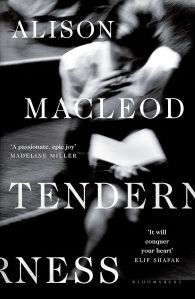 My Thoughts:
My Thoughts:Tenderness is the type of novel that readers will either love or hate, I can’t see any middle ground with this one. It’s enormous, it’s literary, it winds and weaves and jumps around and has about a half a dozen different, and rather complex, stories unfolding. It’s taken me so long to read I felt like I was in a relationship with it. But the time and effort has been so worth it.
‘Any good photo is a secret of a secret’.
I started reading this with the actual book, but after about 200 pages, I decided to give the audiobook a try and I didn’t look back. It is narrated by a cast, and this really went a long way towards enhancing the reading experience, with all of the many characters and storylines, you could all of a sudden distinguish between them all as well as obtaining a vivid sense of atmosphere. Something to note, about the recording. I was listening to it in the car, with my speaker, and then also with earbuds. It was only when I had my earbuds in that I could pick up on something a little extra in the recording. The passages that were of DH Lawrence’s work being recalled by the ‘voice’ that was meant to be DH Lawrence had a sound underneath it akin to an old record. It really gave those parts this old-world feel, but you couldn’t hear that unless you had earbuds in, it was very subtle. Anyway, I highly recommend the audiobook, as far as audio productions go, it’s a real winner.
‘She will never know or need to know the import of the story. She has no interest in its author’s purpose, moral, didactic or artistic. Its ending, she understands, is horrid and sad. But she needs no protections form its inventions and distortions. Indeed, she is grateful to Lawrence. He has, briefly, returned her husband to her, something the army never did.’
Tenderness was the working title for Lady Chatterley’s Lover and the notion of tenderness comes up over and over throughout this novel. The complexity of this novel is immense; I am in awe of the research (there are dozens of pages of sources in the end pages) and the way in which the author has then woven so many threads into a cohesive whole. This really is a novel for those who love the deep dive, the sort of novels that are few and far between now, layers upon layers of characterisation and plotting. It is so beautifully written and gorgeously ‘wordy’, which as you all know is my ‘thing’. I love it when a writer can properly use the English language to its full potential.
‘The violation by language is a difficult thing to describe to those who have not experienced it.’
Tenderness is essentially a story inching its way towards the historic court case whereby Allen Lane, publisher of Penguin books, was prosecuted in the 1960s for intending to issue an unabridged edition of Lady Chatterley’s Lover, which had been a banned book previously. The resulting acquittal of Penguin and Allen Lane is an historic moment in the history of freedom of speech. But instead of just covering this case, Alison MacLeod has created an entire universe in which we are immersed into the history of Lady Chatterley’s Lover and DH Lawrence, from the novel’s creation right through to its reissuing after the landmark acquittal. Along the way, we are in multiple countries with multiple people, spanning decades and even becoming invested in the creation of Lawrence’s other works. This is a complex novel that is best suited to readers who love to know the stories behind the stories, in all their miniature.
‘Some people’s company made you feel lonelier, the gusts of them found your gaps and holes and whistled right through.’
In ending this novel, Alison MacLeod offers us a beautifully imagined ending for Constance and Mellors, the lovers from Chatterley. It was an unexpected yet utterly perfect way to end such a brilliant and absorbing novel. This one sat on my shelf unread for far too long, but perhaps, as is often the way, I eventually read it at the right time.
July 23, 2025
Book Review: Isn’t It Nice We Both Hate the Same Things by Jessica Seaborn
Charlie, a prime-time radio producer in her early thirties, has always had a big group of friends – until she left her husband, and they all sided with him. Now she finds herself floundering in a sea of awkward run-ins and silent group chats. When her best friend Genevieve starts moving on with her life, too, Charlie realises how few significant people she has around her, and what a lonely place that can be.
Dreading the prospect of returning to her childhood home for the anniversary of her father’s death, she busies herself by seeking new friendships – book clubs, pub crawls, team sports, the works. But Charlie’s determination to surround herself with unfamiliar people forces her to confront her insecurities. What kind of life does she want? And who does she really want to spend it with?
For fans of Dolly Alderton and Zoë Foster Blake, Isn’t It Nice We Both Hate the Same Things is a bitingly witty yet moving take on the struggles of maintaining relationships and creating new ones as an adult – a story that ultimately celebrates the importance and complexities of best friends.
Published by Penguin Books Australia
Released 5 August 2025
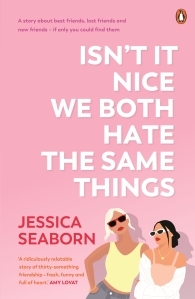 My Thoughts:
My Thoughts:I really enjoyed this second novel by Jessica Seaborn, Isn’t It Nice We Both Hate The Same Things – also, what a title! I think this one might not be what many people are expecting it to be. There’s no romance – winning! – nor is it overly funny. Rather, it’s just entirely real, and I loved it all the more for that.
“In the middle of the conversation, I realised that being an adult is just saying ‘after this week things will slow down a bit’ until we all die.”
I would call this a crossroads story, in that it’s character driven, and the main character driving it is at a crossroads. Six months after a marriage break-up, she’s also finding the other parts of her life are being turned inside out: her career, her friendships, and her family relationships. All of which causes her to have a reckoning of sorts.
Reading this novel was a bit like hanging out with a good friend. I felt invested in Charlie’s life for the duration, enjoyed her witty banter with her co-workers, was outraged on her behalf at the shoddy way she was dropped by her ex-husband’s friends, and felt the deep sadness along with her over the widening rift with her sister and the acceptance of her best friend moving interstate.
I enjoyed the overall story arc and would recommend this one as the ultimate comfort read. It has all the feels and hits the right notes at the right time, all the way through.
Thanks to the publisher for the copy.
July 18, 2025
Thinking Out Loud: When Authors Get Mad – The Ups and Downs of Book Reviewing
Most of my thinking out loud pieces morph out of conversations with those who are a part of my private universe. Over a period time, we’ll go back and forth over whatever it is we’ve been talking about, picking it to pieces until it gets to the point where it feels as though it could benefit from a greater audience of likeminded people. This latest thinking out loud piece is the result of me goading somebody else into writing about it, and I am quite pleased to share this with you and look forward to your thoughts on the topic in the spirit of the type of vigorous discussion that we have always enjoyed here. My guest writer will remain anonymous, but they are an author themselves as well as a reviewer and they bring a wealth of experience along with them regarding this topic.
~~~~~~
A package has arrived – a brand-new book, not yet on shelves. I dive in headfirst. Days later, I’m turning final pages and contemplating the experience with a cup of tea. Notes are taken – raw, unfiltered thoughts which I eventually transform into a review.
Publish. Post. Send.
This private reading experience has now been cast into the world for others to see. Maybe others will have similar feelings? Perhaps I will inspire their next book purchase or library hold? Sometimes these words lead a stranger to their next favourite book. They are words which sell – money changes hands because of them. In the ever-changing book industry, reviews remain integral to the process.
By sending review copies to book reviewers, publishers enter into agreements with them. Free books for an honest review.
This feels amazing when good books land on your doorstep. Everything is fine when enjoying a memorable read – reviews are easier to write, and it’s sunshine and rainbows when that five-star review inevitably drops. The positive reward for such praise can be immense – especially on a personal level for the reviewer.
Some authors quickly reach out, expressing gratitude for the kind words via private messages, emails, or comments sections on Goodreads, Instagram and blogs. Such interactions are overwhelmingly positive – a nice way of breaking down the barrier between author and reader. I have developed numerous friendships with authors like this – real, tangible relationships that moved beyond the book world.
Debut authors are particularly enthusiastic with forming relationships with readers and reviewers. One such author – an Australian celebrity-turned-writer – filmed himself moved to tears while reading my review. Others have placed lengthy ‘thank you’ notes in acknowledgement sections of later books. Directors of publishing companies and publicists have entered my friendship circle on the back of positive reviews.
But what happens when the requested “honest review” means a negative or mixed one? What is the cost of this honesty?
Many publishers tell authors not to read their reviews – the majority ignore this advice. Among them exists a small handful who want to actively wage war on reviewers daring to criticise their work. It’s something that has gained publicity in recent years – often backfiring on the author, sometimes cancelling them. Author motives remain a mystery. Do they hope for edited or deleted reviews? Opinions changed? Or something more sinister?
It was early morning when I received a private message on Instagram. I was still in bed. I had finished reading a debut novel and posted my three-star review the night before. There was much to enjoy, but I felt the author failed some characters and had an unhealthy reliance on animal deaths to portray grittiness and metaphors for life itself.
“You are entitled to respond to my novel in any way you seem fit, and I respect your thoughtful review.”
He then launched into a long-winded spiel defending this use of animal violence, giving me a lecture on everything from the “preciousness” of life to feral animals, roadkill and how one character’s thoughts about incinerated dogs were a reflection on feelings towards a father.
The message was my first negative interaction with an author, but it wouldn’t be the last. I privately shared this with fellow reviewers and industry friends who immediately agreed the author had broken etiquette and lacked professionalism.
Before long, a similarly unusual interaction took place. Instead of direct messaging, they engaged in a strange series of follows/unfollows over one month – this resulted in regular notifications from Goodreads saying the author had ‘followed’ me. Granted, the author’s book featured dementia and paranoia.
Nonfiction isn’t exempt from problematic author behaviour, nor those well-established. One author private messaged me on Instagram, taking issue with my inability to develop rapport with two rich white male explorers – for which his book revolved around. At that point, I had stopped opening private messages from unprofessional authors. I did note, however, the vote manipulation for his book on Goodreads, courtesy three faceless accounts dropping five-star ratings at the exact time he reached out.
Comments sections aren’t immune from riled authors either. “Haters are out on Goodreads,” said one recently, following an honest, albeit negative review of mine. I have seen them jump into other comment sections too, feeling the need to argue their case. During one instance, I witnessed an author post a video on social media that belittled and mocked a fellow reviewer. I’ve heard stories of reviewers being harassed by publishers for leaving mixed reviews on platforms too.
If only these writers remembered they’re published authors and focused on that – a wonderful achievement that only a select few achieve.
Is the “honest review” requested by publishers dead? Is the “honesty” just an illusion? Do reviewers truly have freedom to be honest? Leaving a negative review is no longer solely a reflection of a poor reading experience, it’s increasingly an act which takes courage and bravery – one which sometimes has consequences for the reviewer.
The good reviewers are those willing to make this sacrifice for their followers – look for them. In a world increasingly filled with fake news, questionable integrity, and online bullying, the honest reviewer is someone to be valued and protected at all costs.
July 7, 2025
Book Review: The Story Collector by Evie Woods
One hundred years ago, Anna, a young farm girl, volunteers to help an intriguing American visitor translate fairy stories from Irish to English. But all is not as it seems and Anna soon finds herself at the heart of a mystery that threatens her very way of life.
In New York in the present day, Sarah Harper boards a plane bound for the West Coast of Ireland. But once there, she finds she has unearthed dark secrets – secrets that tread the line between the everyday and the otherworldly, the seen and the unseen.
With a taste for the magical in everyday life, Evie Woods’s latest novel is full of ordinary characters with extraordinary tales to tell.
Published by HarperCollins Publishers Australia
Released October 2024
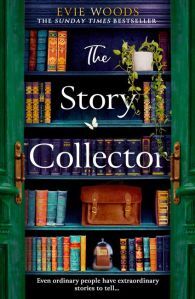 My Thoughts:
My Thoughts:The Story Collector by Evie Woods was this week’s listen. This one is a dual timeline story, one thread set in 1910, and the other set in 2010, with the connecting thread being the place. My initial vibe with the contemporary storyline was that it was a romcom, but this was not the case, and a couple of chapters in the tone shifted dramatically into much deeper themes.
The historical storyline was the backbone of the novel. The main theme orbited around Irish folklore, specifically, the ‘good people’. There were some political issues threaded throughout the narrative, this being two years prior to the Irish Revolution, so the inclusion of these themes added to the overall sense of time and place. I particularly loved the use of the Irish language throughout.
Circling back to the good people, who in Irish folklore are fairies descended from the first tribes to arrive in Ireland, these fey folk are known to bestow both favour and misfortune, including the abduction of people to transform them into changelings. The story collector within this story is compiling accounts of the good people for research and the stories people share with him range from mere sightings to fully horrific situations in which fear of the good people have led to terrible crimes of assault and murder, in the firm belief that a changeling had taken the place of their loved one. Again, far deeper themes than I was expecting.
The only thing that let this novel down for me was the contemporary storyline. I’m not convinced it was necessary. The historical storyline as its own novel, in greater detail, would have elevated this one for me.
July 5, 2025
Book Review: Cure by Katherine Brabon
Vera and Thea are mother and daughter. Vera writes for the internet: she constructs identities and scenarios for brands to cater to the ideal consumer. Yet she also consumes the offerings of the online world herself: the addictive pursuit of a cure, the narratives she craves in which mother and daughter find a way out of the shared experience of chronic illness. She becomes preoccupied with a blog written by a woman named Claudia, a mother whose daughter also has a chronic illness.
While on holiday in Italy, Thea writes in her journal. She is also constructing a character: an image of herself as she grapples with having the same illness as her mother, Vera. But gradually another person emerges in her journal, through her imaginings of her mother in the same house, the same city, at the same age. They have come to Italy to see where Vera’s family originates, but also to chase a promised cure in the form of a man said to be able to heal Thea’s illness.
As they both grapple with their own narratives about their bodies and their wellness, all may not be as it seems. Perhaps a story does not necessarily need to be true for us to believe in it?
Released July 2025
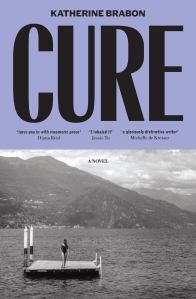 My Thoughts:
My Thoughts:Cure by Katherine Brabon is out in the world now, and I finished *devoured* this one over two evenings. In Cure, Katherine Brabon explores chronic illness and the search for wellness through a mother and daughter who have a shared illness. It’s set in Italy, where they have travelled to, on a pilgrimage of sorts to seek a cure that doesn’t exist for an illness that has no true definition.
‘In truth, she is starting to doubt her mother’s orders, her cures.’
The narrative unfolds from both perspectives and in several forms. Some sections have an omniscient narration, and these sections are presented in italics. For Vera, who is the mother in this story, her sections have a disclosure aspect to them, recounting her own illness journey and then her entrance into motherhood and subsequent focus onto her daughter, who eventually begins to show signs of the same chronic illness. Thea, the daughter, is initially telling her story in the present, but as the novel unspools, her sections begin to resemble a fictionalised diary account where she layers her mother’s identity and experiences at sixteen in Italy, over her own. Sometimes dreamy, sometimes factual, the novel is, above all, engrossing.
‘Thea would struggle and fail to write this later: the moment she walked past her mother, the moment in which she failed to stop and ask her mother if she was okay – she kept walking, registering a feeling of frustration, of not again, of being tired of this, both of them sick, always one of them or the other, fainting or nauseous, limping or aching. She walked past her mother.’
Katherine Brabon writes about living with chronic illness so well, I have already noted this in my review of her previous novel, Body Friend. But this one is also concerned with the quest for wellness and the lengths a person will go to in their quest for this. The money spent, the supplements consumed, the beliefs believed, the isolation, the secrets kept about the extent of this reaching for a cure.
‘Vera considers now that she has been play-acting with this cure narrative, this myth of wellness and the illusion – or delusion – of control.’
The setting comes off as its own character within this novel. There was such a strong sense of place, which I thoroughly enjoyed. I like the honesty of Katherine’s writing, the revealed inner dialogue of her characters, and the exposure of their frailties. This was quite a highly anticipated read for me, and it’s definitely delivered. Highly recommended to those who love their fiction as a quietly unfolding literary experience.
Thanks to @ultimopress for the review copy.
June 28, 2025
Book Review: Slags by Emma Jane Unsworth
It’s the 1990s. Sarah is 15, obsessed with boy bands, sex and getting drunk on Malibu. Most of all, she’s hung up on her teacher, Mr Keaveney.
Fast forward 26 years. Sarah is 41, the last of the party girls. But the mad nights out are losing their shine. And her teenage dreams are now distant, queasy memories.
There’s only one thing for it: an adventure. So, Sarah sets off with her sister Juliette on a whisky-fuelled campervan trip across Scotland.
The sisters have never been alike, but they know all the dark corners of each other’s history – and it’s time to dig up some demons, kicking and screaming.
Because the things that once defined us shouldn’t define us forever, should they?
Published by HarperCollins Australia
Released May 2025
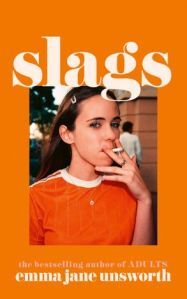 My Thoughts:
My Thoughts:Slags by Emma Jane Unsworth was a brilliant read, really genuinely funny, very slaggy, and also, unexpectedly, a little bit tear jerky. I had seen this book getting around online with positive reviews, but I recently started listening to a podcast called Sara and Cariad’s Weirdos Book Club, and they had the author on. The resulting episode was incredibly entertaining, so funny, and by the end of it, I knew I needed to read this book as soon as possible.
‘Teenage girls had wills of iron and hearts of glass.’
Unsworth has an incredible ability to depict the 90s teenage girl in all her egotistical, brutal glory, the thin veneer of this bolshiness concealing the absolute fragility beneath. There was a lot of nostalgia for me within this read. I finished high school in 1994, and while this novel was set in the UK, there were enough similarities, just change the band names and swap the places they were hanging out, and I was pretty much right back there. And for all their toughness and brassy boldness, which was also familiar, it was what lay beneath the surface that rung my heart out. That period within a young woman’s life where you are no longer a child, not yet an adult, but objectified and vilified, completely out of your depth so often and marked by things that you should not have been exposed to.
‘The 90s were beautiful though. The freedom. We memorised phone numbers. We memorised directions. No one knew what we looked like. No one knew our reasons. No one could reach us. We were gods – and we didn’t know it.’
For all its laughs on offer, at its heart, this is a story about how we drag so much crap from when we’re young into the future with us and the detrimental effect this can have on our life choices. For Sarah, who is assaulted on a school bus and cannot speak about it in any way other than to diminish her experience and joke about it, the weight of that shapes her and leads her down a path of risk-taking behaviour and a reluctance to commit. Instead of owning that this happened to her, and that it was wrong, and that she did nothing to deserve it, she pushes it down and weaves her way around it for decades, her personal life remaining transactional and chaotic, while excelling in her professional life. She frequently jokes that her longest and most lasting relationship has been with alcohol. I really felt so much empathy for Sarah, particularly at the very end of the book, where the author has a short chapter which is made up of Sarah’s medical records from age 14 to 20. It broke me a bit, reading that.
‘Sometimes, something so bad happens that your life stops and starts again; turns around. The past becomes the present and the present becomes the past.’
Slags is also about sisterhood, that beautiful bond that some of us are lucky enough to have. As a way of celebrating her sister’s fortieth birthday, Sarah hires a campervan and plans a road trip into Scotland, just for the two of them. Juliette, however, is going through a crisis of identity within herself and her marriage, something Sarah is not prepared for. Another thing she is not prepared for is finding out that Juliette is having an affair. As the trip unfolds, the sisters push and pull against each other, caught in two worlds, the way they were when they were young, and the way they are right now. This was also recognisable to me, two women, who come from the same household, who are essentially shaped by the same environment, but turn out so vastly different. A sibling is of course a witness to your own early homelife, as you were to theirs, and yet, the memories can still differ. And even after it all comes out in the wash, differences aside, there is at the end that unbreakable bond, the first, and possibly most significant bond you ever formed with another person. Unsworth captures this with utter perfection.
‘Sarah had often said to Juliette: “We had different mothers.” They’d had different versions of the same woman, it was true. Sarah got her first: harried, territorial, phobia-laden. Juliette got her through the buffer of Sarah. But Juliette couldn’t see that, and that was all right. It had been Sarah’s job to protect Juliette from seeing that.’
So funny and so insightful, I found Slags to be a real deep dive into womanhood, who we are, who we want to be, and who we are yet to become. I love novels like this too, with such authentic characters, messy women who haven’t got their shit together. It’s entirely real and so refreshing and relatable. I feel like these sorts of stories enable women to feel okay about where they’re at, without the need for justification or explanations.
‘Why is something defunct in our inward and outward gaze, as women? Why is there such a chasm between what we judge in others and what we appreciate in ourselves? We need someone to bridge that gap. To help us see how we already are what we want to be.’
Book Review: Tenderfoot by Toni Jordan
Wait for the boxes to open, wait for the race to begin. Wait, and your greyhound will cease to be the dog you know and become an entirely different kind of animal.
Brisbane, 1975: Andie Tanner’s world is small but whole. Her mum is complicated, but she adores her dad and the kennel of racing greyhounds that live under their house. Andie is a serious girl with plans: finish school with her friends, then apprentice to her father until she can become a greyhound trainer, with dogs of her very own.
But real life rarely goes to plan, and the world is bigger and more complicated than Andie could imagine. When she loses everything she cares about – her family, her friends, the dogs – it’s up to Andie to reclaim her future. She will need all her wits to survive this new reality of secrets and half-truths, addictions and crime.
With luminous, aching prose, Tenderfoot will move you like no other story this year.
Published by Hachette Australia
Released 26 August 2025
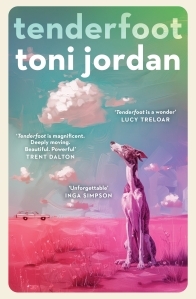 My Thoughts:
My Thoughts:Tenderfoot by Toni Jordan is releasing in late August, but I’m quite a fan of her work and couldn’t wait until closer to that date to read it. This is the fourth novel by Toni I have read, and each of them have been five star reads.
‘It becomes clear in those moments that childhood is as much a place as it is a time.‘
Tenderfoot is a coming-of-age story told almost in the style of a memoir, from the perspective of Andie, looking back on the year she was 12, when her life went from being one thing into entirely another. The writing is everything I’ve come to love about Toni Jordan, witty, honest, deeply introspective, with time and place so neatly woven through the narrative, so much so, that as a reader, you are transported back to Queensland in the 1970s, that wild, corrupt, yet infinitely casual place.
‘The truth is, of course, that everyone can be trusted and no one can be, depending on the circumstances.‘
This is a story about Queensland childhoods in the 1970s, about greyhound racing, gambling, corruption, bad people who still have the capacity to do good things, mothers and fathers who fall off their pedestals in the most spectacular of ways. There are Boy Swallows Universe vibes with this one, and yet it sits firmly within a class of its own.
‘Maturity does not rise smoothly like water filling a tank. Instead, our coming of age is a jerky, unpredictable process, a wild tide coming in on a ragged beach.’
Needless to say, I loved this novel. Towards the end, some truly brutal truths about the history of greyhound racing were disclosed, and these were not easy to read but were nonetheless essential to the telling of this magnificent story. I can’t wait for this to be released and to watch the love pour in once again for Toni Jordan.
Thanks to the publisher for the review copy.
June 27, 2025
Thinking Out Loud: The Rising Tide of Fake Book Reviewers and the Sexualisation of #Bookstagram
I haven’t published a good think piece for quite some time, but I’ve found myself increasingly irritated by many things to do with the book reviewing space of late. On a recent trip to Melbourne where I had the pleasure of catching up with a few book reviewing friends of old (apologies to those that I didn’t reach out to, it was a whirlwind trip), I became aware that I am not the only one feeling this grating sense of being usurped by a rising tide of what I can only describe as fakery. And this might see me being called out, or you might even agree with me, but it’s bothering me enough and it’s spilling out into conversations in both my personal and public life, and I thought it might be about time I have a little rant, so to speak. At the very least, it might give my significant others a bit of a break from listening to me go on about it.
It’s no secret to those of us who blog our reviews, that there has been a move away from the appreciation of blogs as a place in which people look for reviews. Personally, I still feel a significant amount of connection with readers through this space, but I’m not a heavy reader of commercial fiction, and I do know that reviewers who have provided long term coverage of commercial fiction, particularly crime and romance, have seen a downturn in their traffic and the receipt of books from publishers. For myself, receiving books from publishers has never been my end goal. It’s lovely, and I appreciate it, but it’s not my motivation. I review because I love to read and I love to discuss books with likeminded people and I also enjoy leading people to new books, or, as is sometimes the case, saving them from a dull or disappointing read, particularly if they were going to spend hard earned money on their next book. There has been a significant shift in focus in recent years to Instagram, where the book community has exploded, so much so, that many publishers have #bookstagram as their preferred platform for reviews. I’m not going to comment on BookTok, because I don’t use it, I can’t imagine anything worse than watching a person deliver a review via video, but my 23-year-old daughter uses it to find new reads, which I suppose is credible given it’s probably geared for that generation.
I’ve have enjoyed the Instagram book community for a few years now; I have connected with some truly excellent people over there and I highly rate many of their opinions on books when it comes to choosing my own reads. But there’s another aspect that has been creeping in and it’s kind of taking over. The first of these is the fake reviewer. Big call, I know, calling people fake, but there are so many Instagram book accounts with thousands of followers, and they don’t even review a single thing. They just post pictures, tag publishers, claim they’re reading over 30 books a month, and it’s just utter garbage. No one can read that many books. Even if you don’t work, you still have to sleep, and do stuff, it’s not possible to read one, two, sometimes three books in a day. I’ve been reading for forty years, I’ve had plenty of practice, and I’m still not clocking those numbers. And then there’s the reviewers who love everything they read. All the books get five stars; all the books are the best book they’ve ever read. Yeah, sure. And yet, there are publishers that rate this as a form of credible publicity, because it’s all about the clicks, the likes, the traffic. Is this translating into sales? I have no idea. I honestly don’t even care. But it’s enough that when you request a book now, a key question that needs to be answered before you can pass go is how many followers you have. Not how well you can write, not how well you’ve articulated yourself in the past, not how much support you’ve thrown their way for years and years. None of that. Just, what are your likes like?
Hand in hand with this walks the sexualisation of book photos on Instagram. I recently had a woman follow me on Instagram, who says she’s a teacher/librarian. Seemed like my sort of person. Until I looked at her account and noted the prolific posts of herself, posing in the school library with books, and her entire bust hanging out of her clothing. I’m not being prudish here, it was confronting. Because this isn’t what I see as being associated with reading and loving books. It just seems to me that if you have to post a sexualised image of books on your account to get traffic and likes, and free books, you mustn’t have anything worth saying. And this is what bothers me about it. Why can’t your words be enough?
I am fully prepared to cop the flack of being told I’m out of touch, my brand of feminism is outdated, blah, blah, blah. Bring it on. I’m not saying women can’t wear what they want. I’m not saying women can’t post what they want on their own social media accounts. You do you, I’ll do me. What I am saying, is that, is this what is valued? Sexualised images in place of expressing yourself through language and intelligence? Is this what the publishers want? What the public want? I refuse to believe this. Because to accept it, for me, as woman who came of age in the 1990s, who has fought for so many things, and railed against so many prejudices along the way as a woman, this just seems like doing it for the machine. It’s not a statement of your rights as a woman to post sexualised images of your reading life. It’s just incredibly sad that we have come so far and choose to demonstrate so little with the platforms we have access to.
So, what’s the answer here? Leaving Instagram and flocking to somewhere new to enjoy that before it’s broken? Or to stay the course, because there are plenty of brilliant people using that platform well, sharing words, sharing opinions, posting photos of books on their table, not on their cleavage, and doing well despite it. I think this is for me, a small part of a greater issue, a big issue, that is tied up with not just reviewing books, but with respect, for oneself, and for the wider society in which we live. It’s about progress. It’s about value, what we place value on, and what we want others to value when it comes to sharing our opinion on the wonderful, incredible, and inspiring world of books. It’s about getting back to the core of appreciating a well written review. An honest review. Not a load of garbage about how much we’ve read and how well it photographs.
June 15, 2025
Book Review: Let Me Go Mad In My Own Way by Elaine Feeney
Claire O’Connor’s life has been on hold since she broke up with Tom Morton and moved from cosmopolitan London back home to the rugged West of Ireland to care for her dying father. But snatches of her old life are sure to follow her, when Tom unexpectedly moves nearby for work. As Claire is thrown back into a love she thought she’d left behind, she questions if Tom has come for her or for himself.
Living in her childhood home brings its own challenges. While Claire tries to maintain a normal life – obsessing over the internet, going to work and minding her own business – Tom’s return stirs up haunting memories trapped within the walls of the old family house.
Let Me Go Mad in My Own Way is a story of love and resilience, rich with history and drama, and the legacies of violence and redemption. As the secrets of the past are revealed, Claire must confront whether she can escape her history to make her own future – and whether finding herself means facing herself too.
Published by Penguin Books Australia
Released May 2025
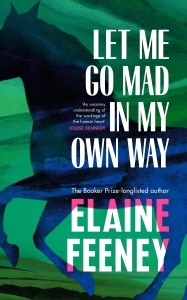 My Thoughts:
My Thoughts:*This review contains spoilers
Every so often I read a novel that cracks me open in a wholly unique way, and these are the ones that define why I read. The way these books make me feel goes beyond a five-star rating. It’s more of an immortalisation of the text within my subconscious. I already expected to get along well with Let Me Go Mad In My Own Way, right from seeing an article about it titled: ‘This might just be the best book to come out of Ireland this year’. I was never not going to read a book with an expectation like that attached to it.
The synopsis for this one reads like it’s a story about a relationship, about coming home, and grappling with the ghosts of the past. Yes, it is about these things, but that doesn’t even begin to scratch the surface. I rarely write reviews that contain spoilers, but I just wanted the freedom to stomp about with this one instead of treading carefully. In the beginning of this novel, Claire has been home in the West of Ireland for some time, having moved back there from London after the death of her mother to care for her father who has a terminal illness. She receives a phone call from her ex-partner’s sister, telling her that Tom is moving to the West of Ireland, in fact, he will be quite close to her, because he is working on a book about Irish men and feels the need to be on the ground, so to speak. This is not welcome news for Claire and derails her. She has lost both of her parents within a short space of time and recalling the way her relationship ended with Tom, while she was in the midst of grieving her mother, is like a wound reopening. To know that Tom is moving to Ireland to write, when he never once accompanied her to visit her family, nor did he attend her mother’s funeral with her, stuns Claire and throws her contained existence into a disarray.
‘Tom Morton had always refused to visit my family in Athenry, even in the wild spring of 2019 when I fell apart entirely and eventually returned home for good as they say. And so – his imminent arrival – it felt like a trespass.’
The story indicates early on that the O’Connor family were not exactly a happy family. The first instance on this is in the retelling of the preparation of their mother’s body for burial and her funeral. The full extent of the dynamics of the household are revealed in pieces, through bitter recriminations and unending grief, things almost disclosed to each other but then left unsaid, a refusal to talk openly about certain things. There is a shadow of violence about the house, lurking and pulling at each of the O’Connor siblings, who have experienced the rage of their father in different ways, borne witness to the indignity their mother was subjected to, and each of them the product of abuse and neglect – the neglect coming from a mother who was unable to care for them as she may have wanted to on account of expending all of her energies on managing her husband’s moods.
‘As though no one would ever know my roots. I didn’t have to tell them about lambs to slaughter, or the sting of Father’s hand long after it left my cheek or thighs, or the tight grip he often had on my upper arm, teeth gnashing drumming home something, once again, that I had done wrong. I didn’t have to explain to them that I used to wet the bed for years, and how it seemed to me that French was far too fine a language to talk of such coarseness, that as a language it could not house the awful vulgarity of my childhood, and there was a freedom in this.’
Claire’s grief is more for her mother than her father. She is living in her family home alone, a place she left and only on occasion returned to in the years after. She did not come back when her mother was ill, and indeed, this weighs heavily on her as she sorts through objects and belongings, sifting through memories and moments, steeped in regret. I felt this keenly, the memories that objects can evoke. Seeing the bits of people lying about and tucked into drawers, even the most insignificant of items possessing the ability to steal your breath. Elaine Feeney writes of this with such tenderness, honouring the way that grief can manifest itself into the form of household items and random bits of flotsam that one remains desperate to hold onto.
‘Mother was about the place in raincoats, some paint cans, her wicker sewing basket still full with tiny spools of coloured thread, needles and measuring tape.’
‘I was, since returning and not leaving, trying to piece her together about the bungalow – bits of her falling out of presses and wardrobes, the drawers of pills.’
Abruptly, the story leaves the present and goes back to two different times. One of them is when Claire and her brothers were young, the other, back further, to the early 1900s, a time when all of Ireland was still one country and the Black and Tans were in force, searching for Fenians by way of pillage, torture, rape, and murder. We begin to see the traumatic legacy that lies within the family history of the O’Connor family, inherited trauma that extends way back to the Famine. Their family provides a microcosm in which Elaine Feeney can examine the history that exists in living intergenerational memory for so many Irish people. These sections from the past are not delivered lightly, in either era. The violence is front and centre, but Feeney also writes of it with such an instinctive ability to convey fear and trepidation, so it is never gratuitous, but still infinitely painful and shocking to be immersed within.
‘It was all the left-behind pain of other people in a building that suffocates me.’
‘Some didn’t take the free round at the bar, others walked out, indignant, and stood about, one man spat viciously outside the pub and another smashed a glass against the arch in honour of his grandfather who was hung upside down by the Black and Tans and his throat slit so he died a long and slow death.’
‘The were owed, they were owed, oh, but they were owed.’
The story in the present day sees Claire reconnecting with Tom and the two of them moving on from their past into a newer kind of territory for both of them. When Claire’s brothers begin to witness this reconnection and note a change in Claire’s character, the younger regards it as positive, the older one is terrified. The only sibling to fully know what caused his mother’s death, the burden of being the eldest son of a violent man and fully informed on his family history has Connor in the grips of a breakdown and he is barely holding it together. He mistakenly believes his sister is treading in their mother’s footsteps within her relationship with Tom, and he cannot accept that she should be at the mercy of a violent man, moreover, an Englishman as well. His fear morphs into a rage against Tom that has a profound effect on the entire family. The full extent of what happened to the O’Connor family at the hands of the Black and Tans one fateful evening is revealed, but the extent that this still weighs upon the current generation was splintering in its intensity. Alongside this, Claire is at last made aware of how her mother died. She starved herself to death, refused to eat for months and months, to avoid having to nurse her husband through his final days, dying before him and leaving him alone, and for one single moment in time, taking control of her own fate.
‘Claire was a good daughter, reading her father, trying to predict his moods, his laughter, if he had drink taken, read his silence, reading the road ahead of him – the day, the weather. She had become much like her mother for trying to make everything fall into place for the family.’
This story is intense, often brutal and stunning, but it was also magnificent. To witness this family break apart and then begin to heal was astonishingly life affirming. Elaine Feeney is a force, the way she writes and the way she lets a story fall open at the most unexpected moments. I know I’ve got a real thing for Irish fiction and rarely do anything other than rave about each Irish novel I read, but this one is truly in a class of its own. I can’t remember which publication it was that I read that initial article in, but I agree entirely that Let Me Go Mad In My Own Way is indeed ‘the best book to come out of Ireland this year’. Perhaps ever.
‘Of course you can love, you’re full of daft love, Claire O’Connor – and that’s both to your credit and your madness.’
June 14, 2025
Book Review: The Sunshine Man by Emma Stonex
In the freezing January of 1989, mother-of-two Birdie Keller wakes to the news she’s been waiting seventeen years to hear: the man who destroyed her life has been freed from jail.
Birdie leaves for London with a gun and a plan: to find him and make him pay. But Birdie is about to enter a world she knows nothing about, of family lies and worn-out loyalties, of secrets and truth, of betrayal and forgiveness. In hunting down justice, she herself becomes hunted – and must ultimately face the echoes of a past she’s never left behind.
The Sunshine Man is the suspenseful new novel from Emma Stonex, bestselling author of The Lamplighters.
Published by Pan Macmillan Australia
Released April 2025
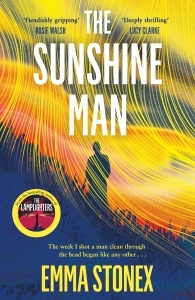 My Thoughts:
My Thoughts:The Sunshine Man by Emma Stonex was a highly anticipated read for me. I loved The Lamp Lighters, her debut, and this one was just as gripping.
Within The Sunshine Man, Stonex explores the notion of self-fulfilling prophecies within the context of a person coming from a ‘bad family’, and beyond this, is redemption possible, or even deserved. Over and over, she challenges the reader to consider cause and effect, to empathise when you would be more inclined to judge.
‘It’d struck him then what had been missing in prison – no, not in prison, but the whole way along, the whole bloody show right from the start of his life – it was this feeling of mattering to someone, of being remembered by someone, of someone knowing his name and bothering to keep it in his mind, of caring about who he was and what he could be and what made him distinct from the next man along, of giving him identity that wasn’t a number or a statistic or a reason why he’d failed, of reminding him he was human, or had started off as human…’
As the novel moves to its inevitable conclusion and the truth of the events of the past comes to light, I was gripped by the story, and also, I’ll be honest, somewhat terrified.
I did a hybrid read of this one, and I highly recommend the audiobook. It has a dual narration, and the tension of the narrative was conveyed to the point where my son asked me if I was okay because I was looking a bit shell-shocked. Five stars to this one.
Thanks to the publisher for the review copy.



